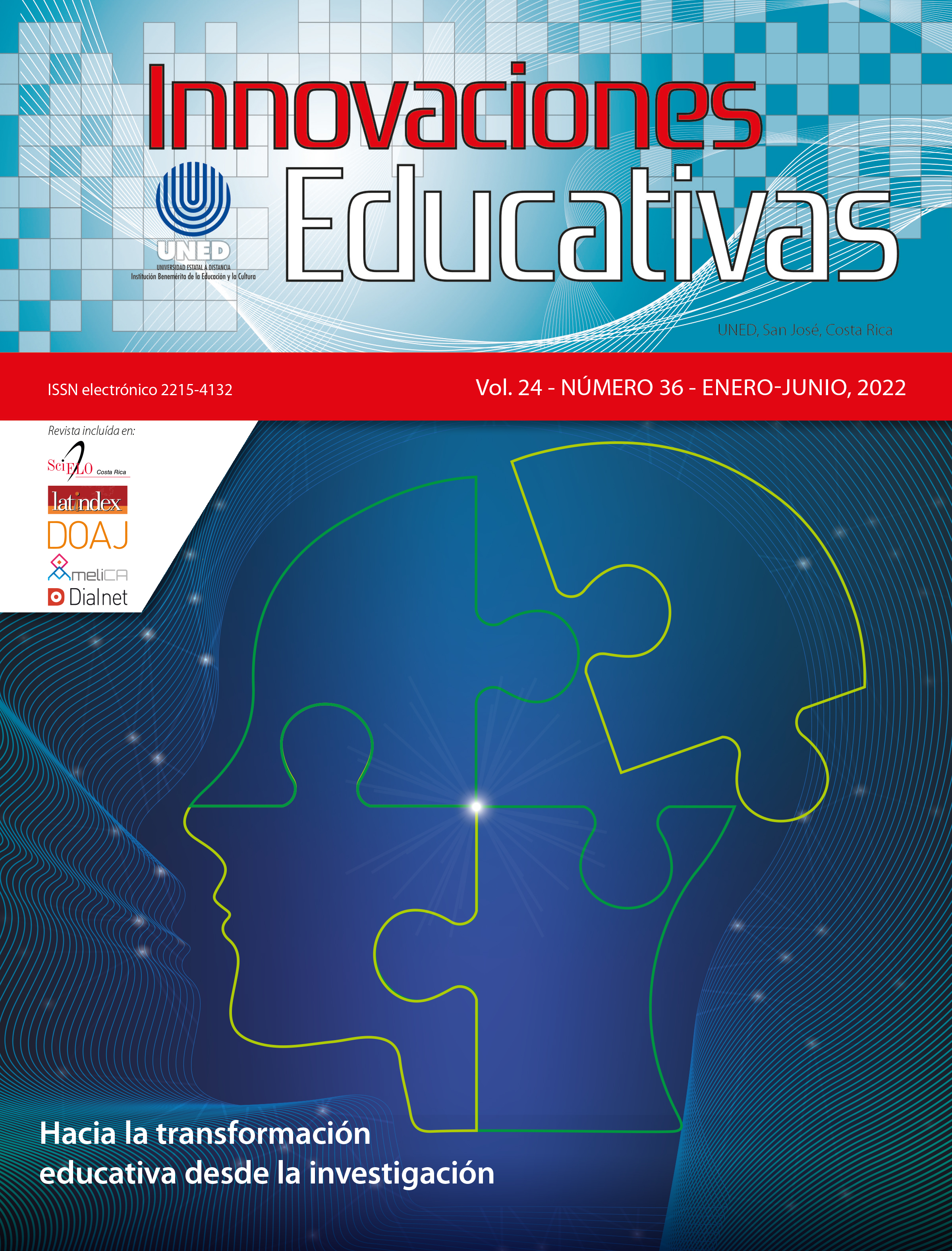Cognitive skills promoted in History and Geography textbooks in Chilean elementary school students.
DOI:
https://doi.org/10.22458/ie.v24i36.3907Keywords:
cognitive skills, school texts, social sciences, geography teaching, educationAbstract
The purpose of the study was to analyze the cognitive skills promoted in History and Geography textbooks for seventh and eighth grade and their correspondence with the skills in the Curricular substructure. The research was conducted under the parameters of the integrative method, which uses elements of hermeneutics and descriptive design, using the documentary analysis technique, application of descriptive statistics, quotations, or fragments that allowed data researching and processing. The highest average, present in the school texts, corresponds to the type of creative skills (57.5%), followed by analytical skills (47.0%), and finally, descriptive skills (42.0%) and critical skills (25.0%). It was not possible to observe significant differences between the promotion of cognitive skills according to educational level. In the eighth grade, creative and analytical skills were more frequent than in seventh grade, as was the presence of a greater frequency of critical cognitive skills. It can be concluded that there is a complete correspondence between the cognitive skills of the Curricular substructure and the educational activities proposed in the school textbooks. Likewise, the activities in these texts promote mental operations and procedures, which involve creative, analytical, descriptive, and critical processes. The skills most present in the texts are: observing, explaining, and applying. The most absent skills are: defining concepts, discussing data, promoting imagination, formulating hypotheses, representing chronological sequences, and proposing solutions to problems.
References
Carretero, M. (2002). Construir y enseñar. Las ciencias sociales y la historia. Buenos Aires: Aique.
Chona, G., Arteta, J., Martínez, S., Ibáñez, X., Pedraza, M. y Fonseca, G. (2006). ¿Qué competencias científicas desarrollamos en el aula? Tecné, Episteme y Didaxis: TED, 20:62-79.
Flores, R. (2009). Observando observadores: una introducción a las técnicas cualitativas de la Investigación Social. Santiago: Ediciones UC.
Godoy, M. (2015). Las preguntas de docentes como estrategia para el desarrollo de habilidades cognitivas de los estudiantes en la asignatura Historia, Geografía y Ciencias Sociales. Foro Educacional, 24:57-76.
Gómez, C., Ortuño, J. y Molina, S. (2014). Aprender a pensar históricamente. Retos para la historia en el siglo XXI. Revista Tempo e Argumento, 6(11):5-27.
Johnson, R. B. y Onwuegbuzie, A. J. (2004). Mixed methods research: a research paradigm whose time has come. Educational Researcher, 33(7):14-26.
Landa, L. y Pinto, V. (2019a). Historia, Geografía y Ciencias Sociales, séptimo año. Texto del estudiante. Santiago: SM.
Landa, L. y Pinto, V. (2019b). Historia, Geografía y Ciencias Sociales, octavo año. Texto del estudiante. Santiago: SM.
Lenoir, Y., Lebrun, J., & Hasni, A. (2016). Análisis de Textos Escolares: Algunos Fundamentos y Desafíos a tener en Cuenta. Revista Iberoamericana de Evaluación Educativa, 5(3):11-30.
Ministerio de Educación (2015). Bases curriculares de Educación 7° básico a 2 medio. Santiago: Unidad de Currículum y Evaluación. Disponible en: https://media.mineduc.cl/wp-content/uploads/sites/28/2017/07/Bases-Curriculares-7%C2%BA-b%C3%A1sico-a-2%C2%BA-medio.pdf
Ministerio de Educación (2018). Circular sobre textos escolares y útiles escolares. Superintendencia de Educación. Disponible en: https://www.supereduc.cl/wp-content/uploads/2018/03/circular-normativa-sobre-textos-y-utiles-escolares.pdf
Ministerio de Educación (2020). Textos Escolares SIGE. https://www.ayudamineduc.cl/ficha/textos-escolares-sige-4
Morales, J. (2017). Pensamiento crítico y lectura en ciencias sociales. Revista electrónica Calidad en la Educación Superior, 8(2):265-282.
Moreno, A., Toro., S., y Gómez, F. (2020). Formación inicial de maestros de educación física: conectando un quehacer pedagógico de colonial con la intervención social, política e insurgente del espacio público. RETOS: Nuevas Tendencias en Educación Física, Deporte y Recreación, 37:605-612.
Peña, S., Toro, S., Cárcamo, J., Hernández-Mosqueira, C. y Cresp, M. (2020). La fragmentación del conocer en educación física. RETOS: Nuevas Tendencias en Educación Física, Deporte y Recreación, 39:231-237.
Portillo, C. (2017). Educación por habilidades: Perspectivas y retos para el sistema educativo. Revista Educación, 41(2):118-130.
Romero, Y., y Tapia, F. (2014). Desarrollo de las habilidades cognitivas en niños de edad escolar. Multiciencias, 14(1):297-303.
Sáez-Rosenkranz, I. (2017). La enseñanza de la historia en los libros de texto de Educación Básica en Chile. Enseñanza de las Ciencias Sociales: revista de investigación, 16:27-40.
Sáiz, S. (2013). Alfabetización histórica y competencias básicas en libros de texto de historia y en aprendizaje de los estudiantes. Revista Didáctica de las Ciencias Experimentales y Sociales, 27:43-66.
Sáiz, J. (2011). Actividades de libros de texto de Historia, competencias básicas y destrezas cognitivas, una difícil relación: análisis de manuales de 1º y 2º de ESO. Didáctica de las Ciencias Experimentales y Sociales, 25:37-64.
Scott, C. (2015). El futuro del aprendizaje 2 ¿Qué tipo de aprendizaje se necesita en el siglo XXI? Paris: UNESCO.
Soaje de Elías, R. (2018). Textos escolares: consideraciones didácticas. Educación y Educadores, 21(1):73-92.

